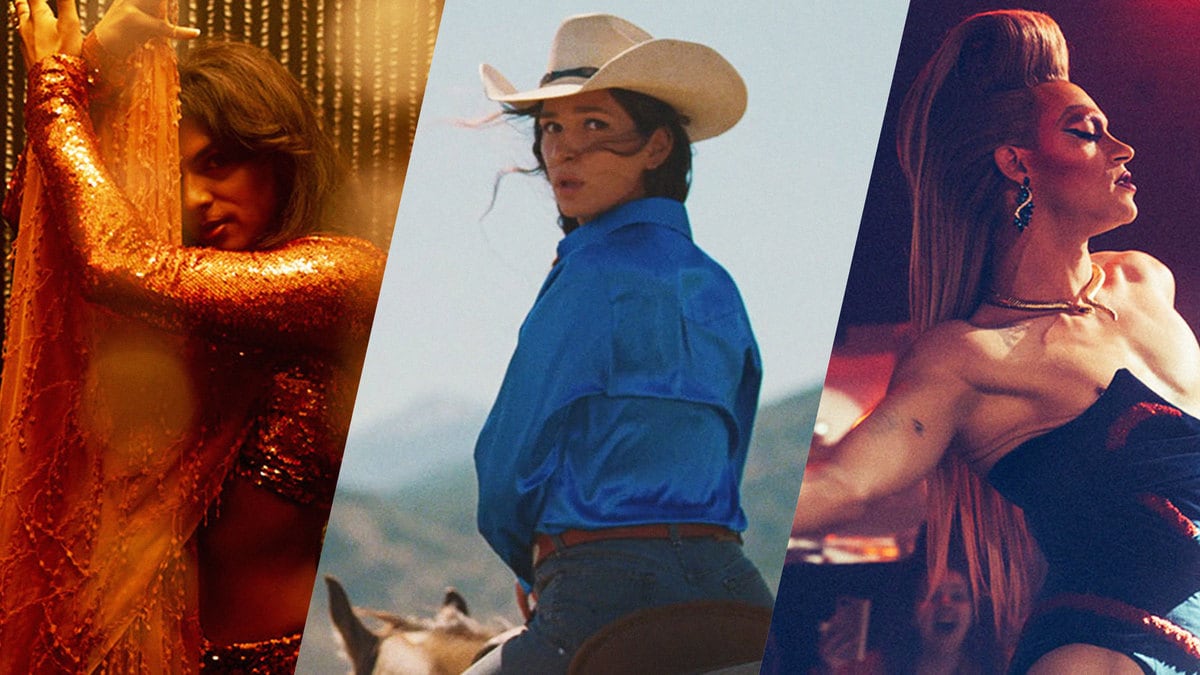It is a sad historical fact that whenever things take a turn for the worse, marginalized communities suffer the most. What’s the cause of the world’s biggest problems? Is it immense corporate greed, an economic system designed to screw the majority or staggering carbon emissions? No, the real reason the world is so bad is, of course, queer people!
Scapegoating minorities is nothing new, but the vitriol toward the LGBTQ+ community, particularly trans people and drag queens, is off the charts. That hatred isn’t just online: As of May 2023, more than 530 anti-LGBTQ+ bills have been introduced around the country.
Among those bills are ones that have aimed to ban drag—drag!—entirely. That’s right: the art form that uplifts queer communities on a daily basis has come under fire from right-wing pundits and conspiracy theorists who believe that drag is a gateway to all sorts of unfounded disgusting things.
But film has a way of fighting back against waves of nonsense. Three great films at this year’s Toronto International Film Festival are all about the extraordinary power of drag as an art form, and the way the medium can unlock the truest parts of ourselves. Excitingly, the three films all come from different countries where anti-LGBTQ+ sentiment is rising: the United States, Canada, and the United Kingdom.
In Canada’s Solo, drag is a full-on celebration. The film stars Théodore Pellerin (On Becoming a God in Central Florida) as Simon, a professional drag queen who tears up Montreal’s drag scene as Glory Gore. Directed by Sophie Dupuis, the film keys into the incredible queer community at the heart of drag. The film opens with Simon performing as Glory to “Voulez-Vous” by ABBA, exuding glamor and a particular energy that has the crowd going bananas.

Drag is a huge part of Simon’s identity, which is fully embraced by his family—his sister even designs his outfits. His father and stepmother giddily attend shows, cheering on Simon/Glory at his performances. Solo examines the fabric of the queer community through drag queens. There’s so much love between the group of Montreal queens that Simon is a part of, and they’re always there to lift each other up—and since they’re drag queens, they also read each other for filth and throw shade, all with love.
Dupuis explores Simon’s emotional and spiritual state by showing him perform throughout the film. When Simon is feeling on top of the world, so are his performances—but when struggles with his toxic partner (also a drag queen) rise, the performances are fraught, tense, and unfocused. It’s not just a fun way to let your movie unfold (who doesn’t want to watch drag performances and a movie at the same time?) but also a brilliant way to reflect how the art of drag is such a valuable outlet for artists, and how their lip syncs to “Si mi chiamano Mimi” by Puccini or “Queen” by Perfume Genius amounts to so much more than just a job—they’re a way to reflect your innermost self.
No matter what Simon goes through in his tumultuous relationship, it’s always clear that drag is what fuels him—it’s what makes “Simon” Simon. That’s especially clear in Glory’s final performance in Solo: Drag has afforded Simon so much, and while he could live without it, life would be far less colorful if he did.
While Simon presents feminine in drag or out, Dylan (Charlie Plummer) in Luke Gilford’s National Anthem presents traditionally masculine. Often wearing plaid and denim and looking like a contemporary cowboy, Dylan is closeted, living in New Mexico with his younger brother and single mother, working odd jobs in construction to cobble together enough money for his family to survive, as well as sneaking away enough to buy an RV and hit the road.
One day, Dylan gets a job at a ranch where everything feels different from what he’s used to in his field. The suffocatingly heteronormative world he’s become accustomed to is shattered at the House of Splendor ranch, where people are openly queer and there’s an energy Dylan has never felt before. It’s overwhelming at first, and Dylan is frightened when he first sees people at the ranch in public. But slowly, surely, Dylan begins to embrace his own queerness, becoming less shy and soft-spoken, owning his differences at the ranch. Drag becomes a way for Dylan to explore and push the boundaries he’s always wanted to but never felt able.

In a thoughtful, intimate scene—the kind National Anthem is so good at—Dylan asks Carrie (Mason Alexander Park), who lives at the ranch, how they got into drag in the first place. Carrie explains their conservative background, revealing that when they came out, their family effectively abandoned them. “Drag for me,” Carrie says, “was a way to show up for myself and love myself at a time where nobody else really could… I always wanted to be the beautiful creature I was on the inside.”
A drag night at a queer rodeo offers Dylan an opportunity he can’t turn down—the chance to perform in drag for the very first time. When Dylan finally performs in drag, it's a showstopping moment. Dylan’s performance to “I’m The Only One” by Melissa Etheridge is sloppy—his movements are erratic, and the lip sync isn’t perfect—but it shouldn’t be. The scene is all about how Dylan feels in the moment, letting his “beautiful creature” out. As the performance goes on, he is more and more comfortable (and on beat), succumbing to the joy and exuberance of drag. From this moment, Dylan is reborn. He’s more confident and more honest; there’s no going back to the man he once was.
While drag is a stepping stone for Dylan to discover his queer identity, it's essential to Ashiq’s (Jason Patel) entire existence in Unicorns. The British film, co-directed by James Krishna Floyd and Sally El Hosaini, follows two people with very different lives: Luke (Ben Hardy), a straight, single dad who works as a mechanic, and Ashiq, a full-time drag queen who performs as the hyper-femme Aysha. Aysha is so femme, in fact, that Luke is convinced Aysha is a woman, and immediately falls for her.

When we first see Aysha perform, it’s mesmerizing. She’s in complete control of the stage. The music practically fades away as Aysha performs, putting all of the attention on her. Just like Luke, we’re unable to take our eyes off a performer at the height of their abilities, commanding the stage. In Unicorns, Ashiq’s work as a drag queen allows him to explore his femininity in ways he was never able to at home. When we see Ashiq get in drag and become Aysha, Patel does fantastic work, from quiet to bold as the transition into drag allows him to tap into parts of his identity he’s unable to otherwise.
While Luke has a relationship with his family, Ashiq isn’t so lucky. He left his home in Manchester behind years ago for the opportunity to be his true self in London. Growing up in a conservative Muslim community, Ashiq was actively discouraged from exploring his identity, especially since it was perceived as not normal. He has never been able to come out to his family, but away from his family, Ashiq can be the person he was meant to be—the person he was born to be.
As Unicorns develops, it shows us what Ashiq’s life is like with and without his drag persona Aysha; with her, theirs is a life full of joy and excitement—a challenging life, certainly, but one worth living. Ashiq is able to live confidently, and out—however trying that may be as a “gaysian.” Without Aysha, Ashiq’s life is cold and gray, a safe life on the margins without trouble, but also without a reason to get up in the morning.
Art and by extension film are always inherently political, reflecting the way our society functions. In times of struggle, cinema can lift us up, and expand our understanding of the lives and worlds we’re unfamiliar with. This year’s TIFF has given us a thrilling look at drag from an international perspective. While Solo, National Anthem, and Unicorns are all very different stories, they all show that drag isn’t dangerous—it’s powerful, freeing, and an invaluable form of self-expression. By examining the humanity behind and surrounding drag, these films take a bold stance against the rise of hatred in their respective countries, fearlessly showing that above all else, drag is an expression of self-love.
Keep obsessing! Sign up for the Daily Beast’s Obsessed newsletter and follow us on Facebook, Twitter, Instagram and TikTok.






